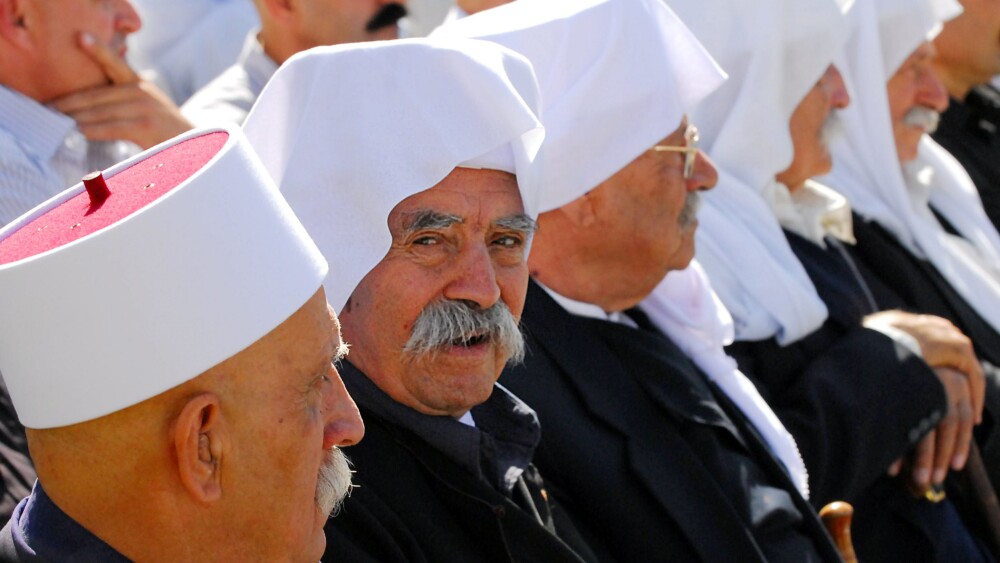On July 15, 2025, Syrian Bedouin backed by Syrian government forces escalated their attack on the Druze in Suwayda, killing almost 1,000. Israeli officials view the Druze-populated area as a buffer zone and demand its demilitarization. As forces aligned with interim President Ahmad al-Sharaa attacked the Druze, Israel responded by attacking multiple sites, including Syria’s defense ministry.
While the immediate crisis might revolve around Israel, Syria, and Turkey, other interested parties are positioning themselves to seize advantage from the crisis. As the Islamic Republic reels from its 12-day war with Israel and faces a potential second round of Israeli strikes, it uses the conflict in Suwayda as a strategic opportunity in three ways.
As forces aligned with interim President Ahmad al-Sharaa attacked the Druze, Israel responded by attacking multiple sites.
First, Tehran seeks to portray Israel, rather than Iran, as a bad actor in the Middle East. Iranian Foreign Minister Abbas Araghchi accused Israel of aggression. “Which capital is next? … Iran supports the sovereignty and territorial integrity of Syria, and will always stand with the Syrian people,” he wrote. On July 18, Seyed Saeed Hosseini, the supreme leader’s representative in Kashan, claimed Israel aims to partition Syria. “Islamic countries should form resistance cells to crush the Zionist regime, the cancerous tumor, and its master, and consign them to the dustbin of history,” he said. Such statements occur while Tehran rearms its proxies in the region.
Second, the Iranian regime stokes fear that Syria could be a dry run for Iran. “If we go, Iran will become like Syria and soon it will be partitioned,” Islamic Republic loyalists have claimed. Since Iran’s sovereignty remains a sensitive issue, the instability in Suwayda serves as a chance to stoke fear of a similar fate. From hardliners to reformists, different media outlets and figures have warned about the territorial integrity of Iran in recent days. The reformist newspaper Ham-Mihan labeled the Druze as separatists and argued that Israel could expand to reach Iran’s border and then partition Iran using the Kurds. The Iranian regime also uses Friday prayers as a platform to advance its political and diplomatic agenda. “The Zionist regime seeks to divide the region, and just as it is trying to do in Syria, its goal is to collapse the unity of nations, especially Islamic Iran,” the leader of Qom Friday prayer said. Former Iranian Ambassador Hossein Mousavian, currently a resident at Princeton University, claimed that the Israeli attack on Damascus was part of its “Greater Israel Project.” Reformist activists like Emad Bahavar seconded the notion that Israel’s goal is to divide Syria.
Iranian authorities hope to use the Suwayda conflict to build new alliances with Islamist factions in the Middle East, particularly those near Syria.
Third, Iranian authorities hope to use the Suwayda conflict to build new alliances with Islamist factions in the Middle East, particularly those near Syria, to reverse recent Israeli diplomatic gains. In past months, Tehran attempted to establish several new camps using Shi’ite militias, under the supervision of the Islamic Revolutionary Guard Corps, for example, in the Iraqi border town of Al-Qa’im, alongside the Syrian frontier. After the 12-day war, Iran continued sending missiles to Hezbollah and weapons from Iraq to Syria to maintain its presence in the Levant. With the Suwayda conflict, the Islamic regime is also active on the diplomatic front. “The world, including the region, must unite to end [Israel’s] unhinged aggression,” Araghchi said. A major theme of the state-controlled press in Iran is that Israel is an unreliable ally for Middle Eastern countries. Several major news outlets in Iran have published an article with the title, “A warning bell for Arab leaders.” Esmaeil Baqaei, Foreign Ministry spokesman, also sought to appeal to Arab nations by urging them to learn from how Israel has treated its neighboring countries.
Recent movements by the Islamic Republic in the region also show that Iran has not completely given up on Syria after former president Bashar al-Assad’s fall. Iran now seeks to exert its influence, mainly through chaos. As al-Sharaa recalibrates Syria’s relationship with Israel and the West but fails to stabilize Syria, foreign ministries and diplomats should neither underestimate Tehran’s efforts to exploit instability nor claw back its influence in Syria at the expense of other regional states.






